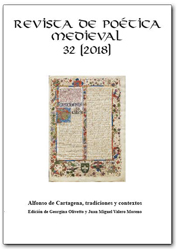Alfonso de Cartagena’s remarks on History and the Historians: Ancient and Modern Princes portrayed in the Duodenarium
DOI:
https://doi.org/10.37536/RPM.2018.32.0.65719Keywords:
Alfonso de Cartagena, Fernán Pérez de Guzmán, Rodrigo Jiménez de Rada, Duodenarium, Epistle to the Count of Haro, Anacephaleosis, Council of BaselAbstract
The permanent contact with other European intellectuals during the sessions of the Council of Basel (1434-1439) must be considered as a fundamental factor to understand the evolution of Alfonso de Cartagena’s political thought and the appearance of some new scholarly interests. Not by chance, don Alfonso began to write his Duodenarium (c. 1442) soon after his return to Castile, under the request of his friend Fernán Pérez de Guzmán. If compared title with contents, we see that don Alfonso could not end the work, since he only answered to four of the twelve questions posed by Pérez de Guzmán. This article focuses on the third, where don Alfonso explains his ideas about History and on the duties of historians.
Downloads
Métricas alternativas
Downloads
Published
How to Cite
Issue
Section
License
The opinions and facts stated in each article are the exclusive responsability of the authors. The University of Alcalá is not responsible in any case for the credibility and aunthenticity of the studies.
Authors will retain the rights on their work, even if they will be granting the journal a non-exclusive right of use to reproduce, edit, distribute, publicly communicate and show their work. Therefore, authors are free to enter into additional, independent contracts for non-exclusive distribution of the works published in this journal (such as uploading them to an institutional repository or publishing them in a book), as long as the fact that the manuscripts were first published in this journal is acknowledged.
Works are published under the terms stipulated in the Attribution-NonCommercial-ShareAlike 4.0 International License (CC BY-NC-SA 4.0) that allows third parties to share the work under the following conditions:
Attribution — You must give appropriate credit, provide a link to the license, and indicate if changes were made. You may do so in any reasonable manner, but not in any way that suggests the licensor endorses you or your use.
NonCommercial — You may not use the material for commercial purposes.
ShareAlike — If you remix, transform, or build upon the material, you must distribute your contributions under the same license as the original.










